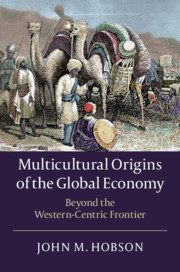Crossref Citations
This Book has been
cited by the following publications. This list is generated based on data provided by Crossref.
Bishop, Matthew Louis
and
Payne, Anthony
2021.
Steering towards reglobalization: can a reformed G20 rise to the occasion?.
Globalizations,
Vol. 18,
Issue. 1,
p.
120.
ALTINÖRS, Görkem
2021.
Rethinking Populism Geopolitically: Authoritarian Populism and Migration Politics in Britain and Turkey.
Bilecik Şeyh Edebali Üniversitesi Sosyal Bilimler Enstitüsü Dergisi,
Berger, Tobias
2022.
Worldmaking from the margins: interactions between domestic and international ordering in mid-20th-century India.
European Journal of International Relations,
Vol. 28,
Issue. 4,
p.
834.
Fisher-Onar, Nora
and
Kavalski, Emilian
2022.
From Trans-Atlantic Order to Afro-Eur-Asian Worlds? Reimagining International Relations as Interlocking Regional Worlds.
Global Studies Quarterly,
Vol. 2,
Issue. 4,
Arian, Anahita
2022.
Before the West: The Rise and Fall of Eastern World Orders.
International Studies Review,
Vol. 24,
Issue. 4,
Gieg, Philipp
2023.
India’s Africa Policy.
p.
33.
Tussie, Diana
and
Chagas-Bastos, Fabrício H.
2023.
Misrecognised, misfit and misperceived: why not a Latin American school of IPE?.
Review of International Political Economy,
Vol. 30,
Issue. 3,
p.
891.
Eagleton-Pierce, Matthew
2023.
Uncovering the City of London Corporation: Territory and temporalities in the new state capitalism.
Environment and Planning A: Economy and Space,
Vol. 55,
Issue. 1,
p.
184.
Shahi, Deepshikha
2023.
Global IR Research Programme.
p.
23.
Richardson, Ben
2023.
Middle England’s empire: Social reproduction in the colonial global economy.
The British Journal of Politics and International Relations,
Kvangraven, Ingrid Harvold
and
Kesar, Surbhi
2023.
Standing in the way of rigor? Economics’ meeting with the decolonization agenda.
Review of International Political Economy,
Vol. 30,
Issue. 5,
p.
1723.
Schmid, Davide
2023.
The Poverty of Critical Theory in International Relations.
p.
101.
Nem Singh, Jewellord T.
2023.
Recentring industrial policy paradigm within IPE and development studies.
Third World Quarterly,
Vol. 44,
Issue. 9,
p.
2015.





